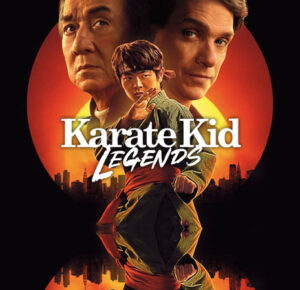 Beginning his career as an assistant director, Masaharu Take has gone from strength to strength as a director with a singular and unique voice. His two most recent movies Unsung Hero (In the Hero) and 100 Yen Love have proven his ability to weave interesting stories, strong visuals and great characters into a cohesive whole.
Beginning his career as an assistant director, Masaharu Take has gone from strength to strength as a director with a singular and unique voice. His two most recent movies Unsung Hero (In the Hero) and 100 Yen Love have proven his ability to weave interesting stories, strong visuals and great characters into a cohesive whole.
With a feeling of deja vu I was attempting to get an interview with Take, and as with Sakura Ando I bumped into him at a film festival party. I managed in the few minutes following to secure an interview with him as he was in town for a few days. A very calm, collected customer, he proved to be an authority on Japanese film and expressive about his creations.
Note: The entire interview was conducted with myself speaking English and Mr. Take speaking Japanese

“100 Yen Love” Japanese Theatrical Poster
MARTIN SANDISON: Have you had a chance to walk around Edinburgh?
MASAHARU TAKE: Yes I’ve been walking around every day.
MS: What do you think of the city?
MT: I want to come back again. There’s not enough time this time. It’s a beautiful city with a lot of history, and the people in it are very friendly. This is a very good film festival, and I want to come back not just for the festival.
MS: Have you seen any other films here?
MT: I’ve seen five films. I only had two days to see films, but yeah a few.
MS: Did you like any one in particular?
MT: I watched Scottish Mussel last night, it was really nice to see Scottish scenes being here.
MS: How did you begin in the film industry?
MT: I didn’t particularly study cinema at school but there’s a social society in University, and I was part of that, and through people I knew from there I got some part time jobs. Then eventually, gradually I got more and more jobs.
MS: What was the inspiration for 100 Yen Love?
MT: The screenwriting began about five years ago with Shin Adachi. It was going to be something where the main character was a female, and someone who would learn how to fight, not just physically but fighting in general.

Sakura Ando (left) in “100 Yen Love”
MS: How was Sakura Ando to work with?
MT: It was actually my first time working with Sakura Ando but as a film-maker I grew working with her. There was a lot to learn from each other and trying to get an actress as famous as her to get motivated to do something was very inspiring.
MS: The end boxing scene in the movie is very intense, how was that to film and were you involved a lot with the choreography?
MT: There were three rounds to the boxing match, each one was choreographed. Each punch, each duck, each cling on to the other person all of it was specifically choreographed so we had both boxers train and practice that routine for one month. One month for the choreography for both boxers to learn and practice that choreography and three months for boxing training.
MS: Were you inspired by any previous films films with boxing scenes in them?
MT: Personally I really liked Raging Bull, the boxing film, but specifically when I think about the boxing scene in 100 Yen Love it’s more about watching actual female boxers and going to their matches and seeing how they fight. It was inspired by the spirit of Raging Bull, but the fighting scene was more about the matches.
MS: Your previous film was the martial arts film Unsung Hero, how was it making that kind of film?

“Unsung Hero” Japanese Theatrical Poster
MT: It was much harder making Unsung Hero compared with 100 Yen Love, because it’s actual action scenes and there’s one hundred people fighting. Unsung Hero was shot in the winter of 2010, then the following summer was when we shot 100 Yen Love so the action scenes and that sort of vitality in the main character of Unsung Hero sort of blended in to Ichiko the main character of 100 Yen Love. There’s a big meaning that in that for both films we didn’t use any doubles it was purely the actors doing the stunts, and that’s meaningful.
MS: How interested are you in the Chambara (Japanese Samurai films) genre?
MT: I like it very much. It was a good opportunity to make that sort of film using that spirit and the techniques of Chambara in my generation.
MS: Takashi Miike made 13 Assassins and Hara Kiri a few years ago, were you inspired by those films?
MT: Miike’s films are all remakes of earlier films, I really like the original versions of 13 Assassins and Hara Kiri, and I watched them before making Unsung Hero. In the garden set in Usung Hero, that was inspired by Hara Kiri. There is a garden and the camera moves around it, that was a homage to Hara Kiri.
MS: Do you have a favourite Chambara film?

“13 Assassins” (1963) Japanese Theatrical Poster
MT: Zatoichi, the old Shintaro Katsu ones, 13 Assassins the original one. Raizo Ichikawa’s films too, do you know him?
MS: Yes… Sleepy Eyes of Death they are called in English. Do you prefer working on a martial arts film like Unsung Hero or a film like 100 Yen Love more?
MT: I do like doing action, martial arts films but that requires a lot of proper budget, a lucrative budget behind you to support you. I’d rather not make something in between. It doesn’t have to be a superhero action film, I prefer to make ones that are like action but like 100 Yen Love so real life people doing action. Do you know Cassevetes’ Gloria? I would like to make something like that. Like a middle aged woman shooting guns. Also something like Leon.
MS: Do you like 70’s films?
MT: 100 Yen Love is more in the same feel as Martin Scorsese, like Mean Streets and Taxi Driver. That was what I was aiming for to begin with.
MS: Can you comment on the relationship between Ichiko and Yuuji in 100 Yen Love?
MT: They’re both very socially awkward people, they have difficulty expressing themselves. But I think they are both in love with each other. They’re not people that are liked by everyone. They’re not good at expressing themselves, but Yuuji has boxing and Ichiko at the start of the film is at home a lot, that’s how they deal with their problems. I had the image of Rocky, if Adrian was the one boxing!
(Laughter)
I sort of relate Adrian with Ichiko. That was always in my mind when making the film.

The colorful Super Sentai-ish cast of “Unsung Hero”
MS: You worked as assistant director on Memories of Matsuko, a very famous film. Can you talk about working on that film, and working with director Tetsuya Nakashima?
MT: It was my first time working with Nakashima on that film, but he has a very talented group of staff, he is capable of bringing staff for each aspect of filmmaking, so that was very inspiring. I was really surprised how Nakashima handled the original screenplay and made it more colourful and illustrative, that was a real surprise for me. I never thought it would actually become a musical! It was a lot of studying and a lot to take from working with him. I was in charge of doing all of the dancing scenes. Nakashima he aspires to Kurosawa, they both have a lot of talented people with them, so trying to get the most out of them, the maximum out of them that was a really good thing he was doing and it was really inspiring to see that. He had a lot of quirks and specifics on the film so nobody got to sleep that much. He also likes films made in the 70’s so I could easily relate to him and what he was trying to make. I really like that film.
MS: Do you have a favourite Japanese film and director?
MT: I really like films made by Yuzo Kawashima. I really like films featuring Ayako Wakao. They are showing a lot of her films in Japan just now. I’ve been co-directing with Kazuyuki Izutsu and I’ve been making about ten films with him and he is another favourite of mine, he has had a big impact on me. There’s a film made in 1980 called Empire of the Sun made by Izutsu, that’s a major inspiration to me, and it’s the film that made me work in film today. It’s about kids that are in gangs growing up in the 60’s in Osaka.

“Raging Bull” Japanese Theatrical Poster
MS: Are there other directors you are influenced by? You talked about Scorsese?
MT: Out of the directors I have worked with it’s Izutsu. I haven’t actually met Scorsese, so out of the people I’ve met it’s Izutsu but growing up Scorsese was a big influence on me and Izutsu aswell.
MS: I think it’s great how Scorsese loves Eastern films; he loves Japanese and Hong Kong films.
MT: Yeah, he is shooting a film called Silence just now that is set in Japan.
MS: What’s your next project?
MT: Hopefully we can start shooting in the winter, I want to make a comedy. 100 Yen Love I think is a comedy, but the new film is about two men who start deceiving people and the comedy that comes out of that.
MS: Ok, thanks very much!
MT: Thanks!
To read more of our interviews, please click here.










 Beginning his career as an assistant director, Masaharu Take has gone from strength to strength as a director with a singular and unique voice. His two most recent movies Unsung Hero (In the Hero) and
Beginning his career as an assistant director, Masaharu Take has gone from strength to strength as a director with a singular and unique voice. His two most recent movies Unsung Hero (In the Hero) and 

















Be the 1st to Comment